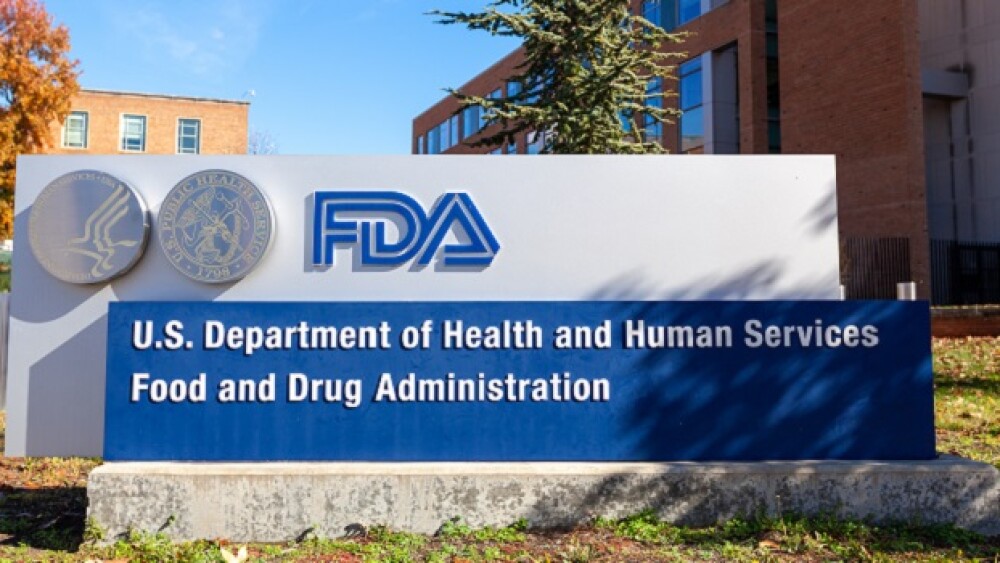In a 12-2 vote with two abstentions, the advisers said the benefits did not outweigh the risks.
Pictured: The FDA Sign in front of a building/courtesy of Grandbrothers/Adobe Stock
Intercept Pharmaceuticals failed to gain the backing of the FDA’s Gastrointestinal Drugs Advisory Committee Friday for obeticholic acid tablets as a treatment for pre-cirrhotic liver fibrosis due to non-alcoholic steatohepatitis (NASH).
Of the 16 independent advisors, just two voted that the benefits of the obeticholic acid (OCA) tablets outweighed the risks based on currently available data. Two members abstained.
Intercept is seeking accelerated approval of OCA 25 mg oral tablets. Submitted studies have suggested a statistically significant improvement in liver fibrosis by at least 1 stage without worsening of NASH. OCA led to dose-dependent improvements in blood levels of liver enzymes and noninvasive measures of liver stiffness after 18 and 48 months, Intercept reported in December 2022.
Fifteen panelists recommended holding off on approval until full data from the Phase III REGENERATE trial are submitted and reviewed. The study is currently expected to wrap up in September 2025.
In a briefing document released Wednesday, the FDA listed myriad safety concerns, including drug-induced liver injury (DILI).
“If you’re talking about millions of people with NASH who could go on this drug [and] 1-in-1000 could get severe DILI . . . you’re talking about a new epidemic of liver disease as an adverse effect of a drug,” said panel member James Floyd, an associate professor at University of Washington, according to Reuters.
In a prepared statement, Intercept CEO Jerry Durso expressed disappointment in the outcome. “We continue to disagree with the FDA on certain characterizations of OCA’s efficacy and safety in pre-cirrhotic fibrosis due to NASH and the role of non-invasive tests (NITs), as discussed in today’s meeting,” he said.
This is Intercept’s second attempt to get OCA approved in this indication. The New Jersey–based biopharma first submitted an NDA in September 2019, which the FDA rejected in June 2020.
The FDA is not required to heed the advice of its advisory committees, though it often does. The FDA’s target action date for this application is June 22.
Original story published May 17:
Intercept Shares Fall as FDA Again Questions Risk-Benefit of NASH Treatment
Intercept Pharmaceuticals was trading 27% lower mid-morning Wednesday after the FDA identified “modest benefits and serious risks” with the company’s obeticholic acid tablets as a treatment for pre-cirrhotic liver fibrosis due to non-alcoholic steatohepatitis.
The FDA’s Gastrointestinal Drugs Advisory Committee will meet on May 19 to discuss Intercept’s NDA for 25-mg obeticholic acid (OCA) oral tablets. Intercept supported its NDA with data from the OCA non-alcoholic steatohepatitis (NASH) clinical development program, which includes two interim 18-month data readouts from the Phase III REGENERATE study.
“NASH requires life-long drug therapy. Trial results for obeticholic acid indicate it causes multiple off-target effects that require multiple risk mitigation strategies with low likelihood of effectiveness,” the regulator wrote in briefing documents released Wednesday ahead of Friday’s advisory committee meeting.
The FDA expressed concern with an acceleration toward pre-diabetes and diabetes, saying, “The general trial population experienced a steady deterioration in glycemic control, with the OCA treatment groups showing worse outcomes compared to placebo.”
The FDA’s staff also noted an “imbalance in the acute kidney injuries” in 25mg-OCA-treated subjects compared to their placebo counterparts, at 15 versus 7. An increased risk of sludge formation in the gall bladder and imbalance of certain lipids were also among the FDA’s concerns.
In addition, the FDA questioned the ability to effectively identify the target patient population—those with stage 2 or 3 fibrosis—saying that non-invasive tests (NITs) lack the required specificity to do so.
Intercept first tried for approval of OCA tablets in this indication in September 2019, but the FDA rejected the NDA in June 2020. In its Complete Response Letter, the regulator stated that the predicted benefit of OCA remained uncertain based on a surrogate histopathologic endpoint and did not outweigh the potential risks to support accelerated approval, according to Intercept.
The company resubmitted the NDA in December 2022, touting “detailed safety analysis of 2,477 patients”, nearly 1,000 of whom had been on the study drug for four years. Intercept also reported analyses from the pivotal Phase III REGENERATE trial where treatment with 25-mg OCA led to “a statistically significant improvement in liver fibrosis by at least 1 stage without worsening of NASH.”
In a statement responding to the FDA’s briefing documents, Intercept re-iterated this supporting data package and stated it “looks forward to a constructive discussion with the Advisory Committee, including addressing areas where the Company’s viewpoints do not align with certain characterizations of OCA’s efficacy and safety in NASH and the role of . . . NITs in clinical practice.”
$24 Billion Market
NASH is a serious, progressive liver disease that can lead to cirrhosis, eventual liver failure, cancer and death. Advanced fibrosis is equated with a much higher risk of liver-related fatalities in NASH patients, according to Intercept.
There are currently no approved treatments for NASH, although the space is packed with biopharma companies vying to be first. In December, Madrigal Pharmaceuticals announced much-anticipated data from the pivotal trial of resmetirom. The candidate hit both primary endpoints and a key secondary endpoint in the MAESTRO-NASH biopsy trial, causing Madrigal’s shares to soar by 209%.
Competitor Viking Therapeutics announced on Tuesday that its candidate, VK2809, achieved the primary endpoint in a Phase IIb study, significantly reducing liver fat in patients with biopsy-confirmed NASH. In March, 89bio reported that pegozafermin reduced fibrosis in 27% of patients with NASH in a Phase IIb trial.
The potential pot is substantial, with a March 2022 report by The Insight Partners predicting the NASH market will exceed $24 billion by 2028.
Heather McKenzie is a senior editor at BioSpace, focusing on neuroscience, oncology and gene therapy. You can reach her at heather.mckenzie@biospace.com. Follow her on LinkedIn and Twitter: @chicat08






